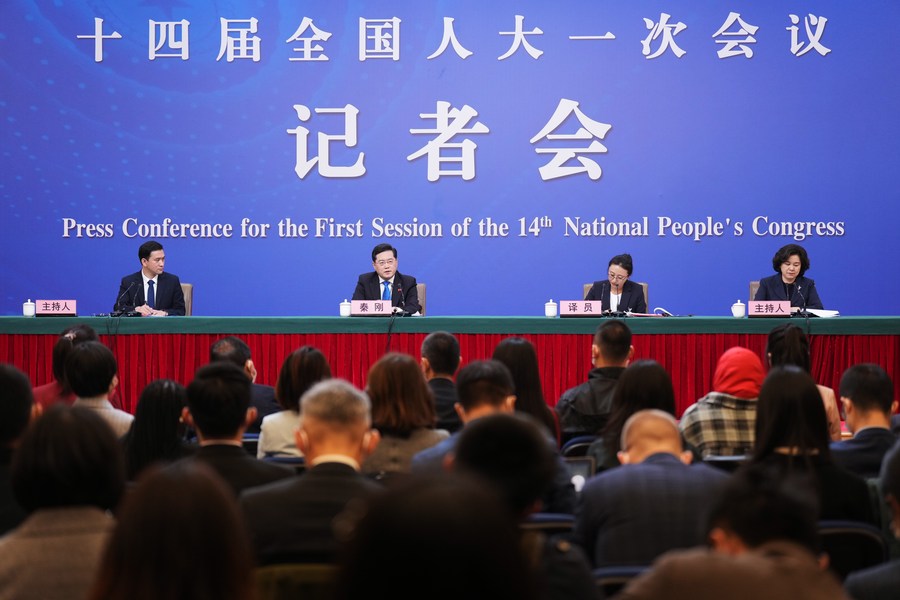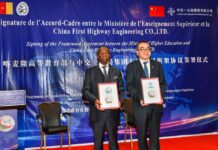China champions peace, development, confronts « jackals, wolves » head on
► China is committed to an independent foreign policy of peace and a mutually beneficial strategy of opening-up.
► China firmly opposes hegemony and the Cold War mentality.
► China champions an open and inclusive world economy and the building of a community with a shared future for humanity.
Beijing – China on Tuesday pledged its commitment to global peace and development, as well as its readiness to confront « jackals or wolves » head on to defend its sovereignty, security and development interests.
Foreign Minister Qin Gang stated China’s commitment to an independent foreign policy of peace and a mutually beneficial strategy of opening-up at a press conference held on the sidelines of the annual session of the National People’s Congress.
Qin emphasized China’s opposition to decoupling, the severing of industrial and supply chains, and unilateral sanctions, saying the country firmly opposes hegemony and the Cold War mentality.
China champions an open and inclusive world economy and the building of a community with a shared future for humanity, offering more Chinese insight and solutions to help meet humanity’s common challenges, he said.
New type of int’l relations
Qin said China pursues coordination and sound interactions among major countries and promotes a new type of international relations.
In terms of major-country relations, Qin stated that China-Russia ties are characterized by strategic mutual trust and good neighborliness, and they serve as a model for a new type of international relations.
The China-Russia relationship « is not a threat to any country, nor is it subject to any interference or discord sown by any third party, » Qin said.
« The more unstable the world becomes, the more imperative it is for China and Russia to steadily advance their relations, » he said.
Regarding China’s relations with the United States, Qin said China « pursues a sound and stable relationship with the United States. »
The China-U.S. relationship should be determined by common interests and shared responsibilities of the two countries, and by friendship between the Chinese and American people, rather than by U.S. domestic politics or hysterical neo-McCarthyism, he said.
« The U.S. claims that it seeks to out-compete China but does not seek conflict. Yet in reality, its so-called competition means to contain and suppress China in all respects, and get the two countries locked in a zero-sum game, » Qin said.
He said the U.S. rhetoric of « establishing guardrails » and « not seeking conflict » simply means China should not respond in words or action when slandered or attacked. « That is just impossible. »
« If the U.S. does not hit the brake but continues to speed down the wrong path, no amount of guardrails could prevent derailing and there will surely be conflict and confrontation, » Qin said.
In response to a question about the Ukraine crisis, Qin said China chooses peace over war, dialogue over sanctions, and cooling down the situation over fueling the flames, calling for calm, reason and dialogue among the parties involved.
China has not provided any weapons to either side of the Ukraine conflict and it always makes its judgments independently, based on the merits of the issue, he said.
« There seems to be an invisible hand pushing for the protraction and escalation of the conflict, » using the Ukraine crisis to serve certain geopolitical agenda, Qin said.
Qin expressed China’s hope that Europe will achieve true strategic autonomy as well as lasting security and stability, saying China is willing to work with Europe to uphold « true multilateralism » and deepen their comprehensive strategic partnership.
Concerning the United States’ « Indo-Pacific Strategy, » Qin said its real purpose is to « encircle China, » warning that such an attempt will only disrupt the ASEAN-centered open and inclusive regional cooperation architecture, and undermine the overall and long-term interests of countries in the region.
Qin said that China always treats Japan with goodwill and hopes for friendship and good-neighborliness. « Yet, should some people from the Japanese side choose a beggar-thy-neighbor approach rather than pursue partnership, and even take part in a new Cold War to contain China, bilateral relations would only suffer new wounds when the old ones are yet to be healed, » he said.
Also during Tuesday’s press conference, Qin noted that developing countries account for more than 80 percent of the global population and more than 70 percent of global economic growth. « People in developing countries are entitled to better lives, and developing countries are entitled to greater representation and a louder voice in international affairs, » he said.

Chinese path to modernization
According to Qin, Chinese modernization serves as an important source of inspiration for the rest of the world, particularly for developing countries.
Qin said the Chinese path to modernization fits in well with China’s national conditions, and its success « proves that every country has the right and ability to choose its own path and hold its future firmly in its own hands. »
Chinese modernization is characterized by peaceful development and « is not pursued through war, colonization or plunder, » he said, calling it « a new path different from Western modernization. »
Qin said the right of every country to pursue a modernization path tailored to its national reality should be respected.
The Belt and Road Initiative (BRI), a high-quality public good initiated by China, has benefited the world.
Over the past decade, the BRI has brought nearly a trillion U.S. dollars of investment, established over 3,000 cooperation projects, created approximately 420,000 jobs in countries along the routes, and helped lift nearly 40 million people out of poverty.
In response to allegations that the BRI can lead to debt traps, Qin said it is never China that should be accused of creating so-called debt traps, and that multilateral financial institutions and commercial creditors account for over 80 percent of sovereign debt in developing countries.
Qin expressed his belief that, as China accelerates high-quality development, promotes high-standard opening-up and fosters a new development paradigm, it will surely bring new opportunities to all countries in the world.
READMore
- Cyprus Limassol carnival culminates in grand parade
- Xi Jinping’s economic thought steers China toward modernity
- China not Africa’s largest creditor: spokesperson
- NPC annual session to open Sunday
- Revision of China’s Legislation Law embodies whole-process democracy
- Xi Focus: A look at Xi’s governance thought through catchphrases at « two sessions »
- New BBC Africa Eye investigation shines a light on Seychelles’ heroin epidemic
Confronting « jackals, wolves » head on
At the very heart of China’s core interests, the Taiwan question is the bedrock of the political foundation of China-U.S. relations, and « the first red line that must not be crossed in China-U.S. relations, » Qin said.
Qin urged the United States to cease containing China by exploiting the Taiwan question, and to return to the fundamentals of the one-China principle.
The real threats to peace and stability across the Taiwan Strait are the separatist forces seeking « Taiwan independence, » he said, noting that the one-China principle serves as a solid anchor and the three China-U.S. joint communiques serve as genuine guardrails.
« Mishandling of the Taiwan question will shake the very foundation of China-U.S. relations, » he warned.
No country has the right to interfere in Taiwan affairs, as resolving the Taiwan question is China’s own business, he said, emphasizing that « one should never underestimate the firm resolve, strong will and great capability of the Chinese government and people to safeguard national sovereignty and territorial integrity. »
Responding to another question, Qin said that so-called « wolf warrior » diplomacy is just a narrative trap fabricated by those who either know little about China or its diplomacy, or have a hidden agenda that disregards the facts.
« There is no shortage of kindness and goodwill in China’s diplomacy, but in the face of ‘jackals or wolves,’ Chinese diplomats have no choice but to confront them head on to protect the motherland, » Qin said.




